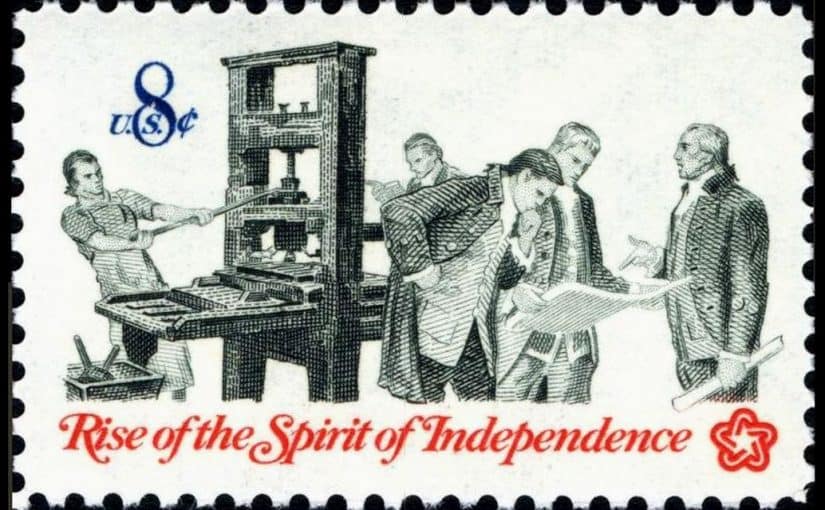Principles of Liberty: Ten Biblical Truths Embedded in the Declaration of Independence
A Five-Session Bible Study
Background Information for Session 3
Equality and Rights: Self-Evident Marks of the Creator on Humanity
The Quest to Rediscover the Founders’ Perspective
This Bible study series is based on the Word Foundations post titled “Principles of Liberty.” The article highlights ten biblical principles embedded in the Declaration of Independence.
The Bible study series consists of five sessions, with each one exploring two principles.
This article provides background information for the third session. A teaching plan is available here.

A PDF file of the above graphic is available here.
It’s high time we rediscover the true meaning of these principles and that we contend anew for them as the Founders understood them. In our series, we’re highlighting words and phrases from the most quoted portion of the Declaration, then we’re demonstrating how they’re linked to Scripture and to biblical truth. In this session (the third of five), we’ll be considering the fifth and sixth principles.
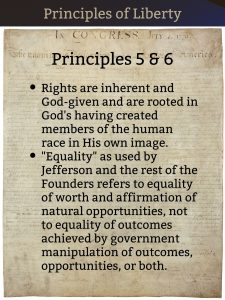
A PDF file of this graphic is available here.
PRINCIPLE FIVE
Rights are inherent and God-given and are rooted in God’s having created members of the human race in His own image.
In the Declaration of Independence, America’s Founders make this profound statement forthrightly and unapologetically:
We hold these truths to be self-evident, that all men are created equal, that they are endowed by their Creator with certain unalienable Rights, that among these are Life, Liberty and the pursuit of Happiness.
Let’s briefly explore the rich meaning of the term self-evident. In his book Defending The Declaration: How the Bible and Christianity Influenced the Writing of the Declaration of Independence, Gary Amos writes,
Seventeenth-century Enlightenment rationalists did not coin the term “self-evident.” Medieval theologians used the term centuries earlier, tracing their views of “self evident” to the teachings of St. John of Damascus (d. 749)…. John was the last of the Greek fathers and and the first theological encyclopedist. “Self-evident” knowledge for the medievalists was that which was “naturally implanted” in men, such as “first principles.” It was truth known intuitively, as a direct revelation from God, without the need of proofs. The term presumed that man was created in the image of God, and presumed certain beliefs about man’s rationality which traced as far back as Augustine in the early fifth century.…
[Going back even earlier, t]he writings of the Apostle Paul in Romans 1 and 2 are the Biblical source for the Christian belief about self-evident truth.1
In Romans 1:19, note especially the phrase manifest in them (meaning “evident in themselves”), and in verse 20 the words are clearly seen, being understood by the things that are made (also carrying the idea of “self-evident”). Here is Romans 1:18-23 in the New King James Version.2
What, specifically, does the Declaration proclaim to be self-evident? The truths
-
-
- that all men, or persons, are created equal;
- that their Creator endows or gives them certain rights; and
- that those rights, because they are God-given, are inherent, innate, absolute, and unalienable; and
- that included in these God-given rights are rights to live, live freely, and to pursue happiness without interference.
-
In God’s Image
Let’s return to Gary Amos’s assertion that the term self-evident “presumed that man was created in the image of God, and presumed certain beliefs about man’s rationality.”3
Of course, the the fact that the members of the human family were and are rational beings is in itself evidence that God has made them in His image. It indeed is self-evident that people are special, set apart from the rest of the created order. For example, no sense of morality exists in the plant or animal kingdoms, yet it clearly does among people. Humanity also is uniquely creative. Consider, for example, the arts. While it’s true animals build and produce, they do so according to their instincts. They do not have imaginations as do members of the human race. Other qualities set people apart from the rest creation as well, things such as human appreciation of beauty, the practice among humans of wearing jewelry and ornate clothing, and language.

Here’s a story that highlights the uniqueness of humanity. A teacher instructed her students to list the Seven Natural Wonders of the World. After giving them enough time, she told them to pass their papers forward. One student, however, expressed frustration. “There are so many!” she said. “It’s been hard to decide which ones to include.” The teacher asked to see the student’s paper and discovered she had written,
1. the ability to see
2. to hear
3. to touch
4. to smell
5. to taste
6. to laugh
7. to love4
While many animals have some of these attributes, only human beings have them all, and only humans can appreciate them. On this page is an article with a list of not less than 31 traits that set human beings apart from the rest of creation.
The idea that humans are special among the members of God’s created order is important, but it really is only a starting point for us as we consider God-given rights. Because human beings are special and bear God’s image, God has given them rights, not after He created them in His image, but by virtue of creating them like Himself (not godlike, but like God in significant ways, even though people are and remain mortal). These rights are not the government’s to give; nor are they the government’s to take away. What is the duty of the state? One of its primary responsibilities is to uphold and protect inherent rights.
This means not only that the state has the duty to refrain from interfering when citizens and groups exercise their God-given rights, but also that it must keep other individuals and groups from interfering as well. Here’s how we expressed this idea in our main article.
Citizens must have the freedom and liberty to pursue their dreams. For individuals, this means affirming the dignity of all and not thwarting the efforts of others to reach their God-given potential. For government, it involves protecting people’s efforts to achieve, accomplish, produce, and yes, build wealth. It is the job of the government
-
-
-
-
- to keep citizens from hindering other citizens’ efforts to achieve, and
- to refrain from hindering them itself.
-
-
-
It is critical that we understand the kind of rights to which the Founders were referring. To do that, it is helpful to recall a portion of a famous address made by Franklin Delano Roosevelt, the 32nd president of the United States.
The “Four Freedoms”
On January 6, 1941, a mere 11 months before Pearl Harbor would be bombed and America would enter World War 2, President Roosevelt gave his State of the Union speech. Later it became known as the “Four Freedoms Speech,” because near the end of his address, Roosevelt upheld “four essential human freedoms”—
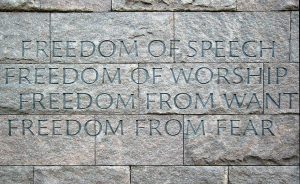
-
-
- freedom of speech and expression,
- freedom of religion,
- freedom from want, and
- freedom from fear.
-
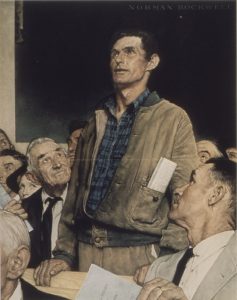
The Four Freedoms are noble ideals that have stirred human emotion and encouraged millions of people to sacrifice for others—even people they never had met. We do well, however, to examine the Four Freedoms, which essentially are presented as rights, carefully. Certainly we never would want to hinder free expression or worship of God; nor would we wish want or fear on anyone. We actually may be tempted to “jump on the bandwagon” to affirm all four as attainable. Yet we need to respond to these ideas not just with our hearts, but also with our heads. We need to ask about each one, What does this freedom require on the part of a government and its people, and what will be the effects, both intended and unintended, of efforts to secure it? When we answer honestly, we discover a great deal more than our emotions have told us at the outset. Actually, we discover things contrary to what our emotions likely have said.
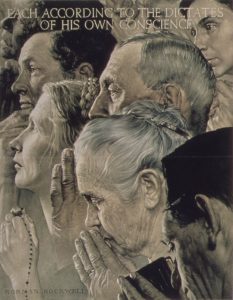
The first two freedoms, Freedom of Speech and Expression and Freedom of Worship, are rights guaranteed in the First Amendment to the US Constitution. To secure them, government is primarily required to stay out of the way and to allow people to speak freely and practice their religious faith as they see fit. Whenever people hinder or prevent their fellow citizens from exercising their rights of speech and worship, government’s role is to penalize them for violating others’ rights. With regard to the first two freedoms, therefore, government action, generally speaking, is clearly defined and limited.
Qualitatively Different

Upon reflection, it isn’t difficult to see that the third freedom—freedom from want—is fundamentally different from the first two.* The difference is qualitative; it is not a difference of degree, but of kind.
While the goal of reducing want was and is laudable, Roosevelt was saying people had a right to be free from want! This assumption gives government a task God never intended it to have. How are people’s needs to be met? According to Scripture, individuals are to work to provide for themselves and their families. Not everyone can; but everyone who can, should. You can take it to the bank: When government becomes engaged in working directly to eliminate want, it almost invariably does so through taxation and redistribution of wealth. As it does this, it creates lack or want in the places from which it takes resources.
This approach stifles creativity and productivity. It effectively kills citizens’ motivation to work hard and grow the national economy. Why should I work if my hard-earned money will be taken away from me to meet the needs and demands of those who refuse to work? With a motivation to work, however—with the assurance that hard work will be rewarded with pay one can keep and use as he or she sees fit—a scenario unfolds that helps reduce poverty to a far greater extent than any plan relying on redistribution.
Actually, plans to reduce poverty through taxation and redistribution exacerbate the problem. Government is a terrible benefactor! It cannot create wealth but only can take from those who do. When it does so excessively and uses those resources irresponsibly (two things government is quite prone to do) it chips away at workers’ incentive to produce.
We need to understand that biblically, it isn’t just work that is to be satisfying, but also the wealth produced by that work. This is not selfishness or greed, but a contentment resulting from efforts expended, accomplishments met, and compensation received. Moreover, with wealth so gained, workers are in a position to be generous. They willingly can help those who have legitimate needs (see Eph. 4:28). Generosity, you see, also is satisfying and rewarding.
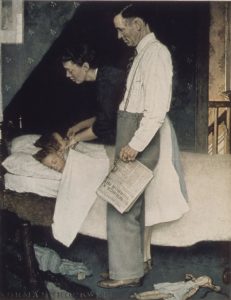
The fourth freedom, or right, is much like the third. To secure freedom from fear, government must actively intervene in the lives and the affairs of its people. Do not misunderstand. Nations clearly have a duty to shore up defenses and to use them to keep their people safe from aggressors inside and outside their borders. In this sense, governments are legitimately engaged in minimizing fear.
Beware, however! Treating this as a right means obligating government in ways that empower it to interfere in people’s lives! Roosevelt spoke at a time when war was on the horizon, but many fears are not related to war. Just how far will government go to meet its citizens’ “right” to live fear-free lives? In business, no one can succeed without taking risks, something that is inherently frightening. So if a government eliminates fear, it eradicates success as well! This is bad enough, but keep in mind we’re talking about more than business. The effort to wipe out fear, especially among a national population, inevitably will become a quest without end.
Negative and Positive Rights
Social and political scientists call FDR’s first two freedoms in his “Four Freedoms” speech negative rights, and the second two freedoms positive rights. This may sound strange, but we need to remember that the terms negative and positive in this context do not mean “bad” and “good”—the meanings that come to mind in many situations. In this context, negative means “restraint on government action,” and positive means “requiring government action.”
Numerous other “freedoms” or “rights” will fit into one of these categories or the other. The Founders believed that authentic liberty thrives in a nation when that nation’s citizenry is guaranteed negative rights. These are the “unalienable” rights of which the Declaration speaks, including “Life, Liberty and the pursuit of Happiness.” They also are the rights the Bill of Rights seeks to protect by limiting government.
Against this backdrop, it’s important to note that the Ten Commandments, which is a list of moral responsibilities, also is a list upholding negative rights (such as the right to worship God, the right to work, the right to life, the right to be respected and honored in one’s family and as a member of one’s family, the right to own and manage property, and the right not to be defamed or maligned). The centerpiece of God’s moral law, then, isn’t just about protecting others from malicious actions you might perform against them, but also about protecting you from actions they might take to mistreat you.
Today, unfortunately, Americans view rights in ways the Founders did not. Most see rights as entitlements shaped, crafted, and granted by government. As we’ve already implied, this flies in the face of these words from the Declaration of Independence:
We hold these truths to be self-evident, that all men are created equal, that they are endowed by their Creator with certain unalienable Rights, that among these are Life, Liberty and the pursuit of Happiness. — That to secure these rights, Governments are instituted among Men, deriving their just powers from the consent of the governed….
The Founders believed that authentic liberty thrives in a nation when that nation’s citizenry is guaranteed negative rights. These are the “unalienable” rights of which the Declaration speaks, including “Life, Liberty and the pursuit of Happiness.”

We need to understand that FDR’s speech reflected the nation’s perspective on rights every bit as much as it shaped and molded it. Significantly, hearing the president’s speech and not readily being able to recognize the fundamental difference between the first two freedoms and the last two demonstrates that even then, the nation already had moved away significantly from some of the principles upon which it was founded.
Today, we Americans have such an entitlement mentality that when we think of rights, we almost exclusively think of them in terms of a “positive rights perspective.”
Sadly, government would continue to grow and feed the populace the lie that rights come from government, even though it would not use these same words. Today, we Americans have such an entitlement mentality that when we think of rights, we almost exclusively think of them in terms of a “positive rights perspective.” For this reason alone (and many others exist) it is urgent that Americans rediscover this principle embedded in the Declaration, as well as its biblical underpinnings. It’s on our list as Principle 5. Rights are inherent and God-given and are rooted in God’s having created members of the human race in His own image.
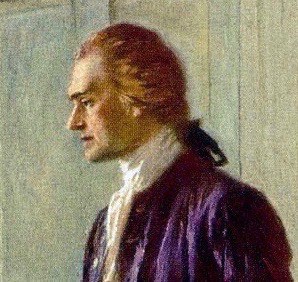
Thomas Jefferson declared, “A wise and frugal Government, which shall restrain men from injuring one another, which shall leave them otherwise free to regulate their own pursuits of industry and improvement, and shall not take from the mouth of labor the bread it has earned. This is the sum of good government, and this is necessary to close the circle of our felicities.”
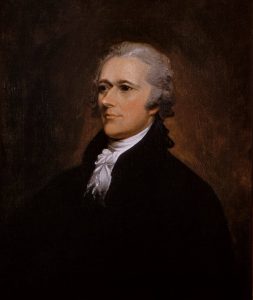
Alexander Hamilton said this: “[If you understood the natural rights of mankind,] [y]ou would be convinced that natural liberty is a gift of the beneficent Creator to the whole human race, and that civil liberty is founded in that, and cannot be wrested from any people without the most manifest violation of justice.”
PRINCIPLE SIX
Equality as used by Jefferson and the rest of the Founders refers to equality of worth and affirmation of natural opportunities, not to equality of outcomes achieved by government manipulation of outcomes, opportunities, or both.
Our comments about this principle in our main article were quite brief. Here’s what we said.
This principle elaborates on the fifth principle. The Founders correctly saw equality as being at the “front end” of people’s lives rather than the “back end,” a place at which people arrive only after government has orchestrated and rearranged the playing field.
This latter concept of equality consistently is 1) elusive, 2) unsatisfying, and 3) a poison that kills people’s personal incentive to work and achieve. Despite this, you’ll find many advocates for this concept of equality among those contending for so-called “social justice” today.
We must not miss this important point. Government manipulation — the state’s engineering circumstances to “level the playing field” to supposedly achieve “equality” — is not based on a recognition of God-given, inherent rights! Rather, it is government’s playing God! It is government’s
-
-
- abandoning its assigned duty to recognize and protect unalienable, negative rights and instead
- taking upon itself authority that is not rightfully its own, authority to create and dispense positive rights.
-
Mark it down: what government gives, it can take away. Remember, America’s Founders were clear about the role of government with respect to rights: “to secure [or to make secure] these [unalienable, God-given] rights, Governments are instituted among Men, deriving their just powers from the consent of the governed.”
Here we could discuss many examples of government actions in recent decades to play God by acting to fashion and dispense positive rights. In fact, in our next session we will spend a good bit of time talking about the negative fallout with regard to the the state’s redefining marriage. Here let’s look briefly at another example — that of affirmative action.
Economist Thomas Sowell writes,
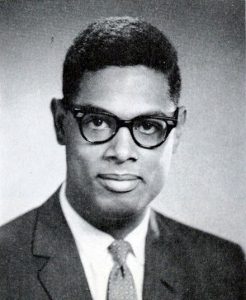
Affirmative action is supposed to benefit black and other minority students admitted with lower academic qualifications than some white students who are rejected.
[…]Despite much media spin, the issue is not whether blacks in general should be admitted to higher-ranked or lower-ranked institutions.
The issue is whether a given black student, with given academic qualifications, should be admitted to a college or university where he would not be admitted if he were white.
Much research over the years has confirmed… that admitting black students to institutions for which their academic preparation is not sufficient can be making them worse off instead of better off.
I became painfully aware of this problem more than 40 years ago when I was teaching at Cornell University and discovered that half the black students there were on some form of academic probation.
These students were not stupid or uneducable. On the contrary, the average black student at Cornell at that time scored at the 75th percentile on scholastic tests. Their academic qualifications were better than those of three-quarters of all American students who took those tests.
Why were they in trouble at Cornell, then? Because the average Cornell student in the liberal arts college at that time scored at the 99th percentile. The classes taught there — including mine — moved at a speed geared to the verbal and mathematical level of the top one percent of American students.
The average white student would have been wiped out at Cornell. But the average white student was unlikely to be admitted to Cornell in the first place. Nor was a white student who scored at the 75th percentile.
That was a “favor” reserved for black students. This “favor” turned black students who would have been successful at most American colleges and universities into failures at Cornell.
And Cornell is not unique, either. This is a problem occurring at many other schools as well. And it’s happening to very talented students, students who would thrive at other schools that actually are a better fit for them and their academic skills. This is not to disparage minority students at all. The point is this: Why set any student up to perform poorly in a place where expectations do not match his or her academic skills and ability to perform? By manipulating the playing field to make it possible for some students to enter schools where they would not be accepted if they were treated as all other applicants, government-sanctioned affirmative action policies set these young men and women up for discouragement, and in some cases, failure.
This is but one example of many that exist. And it represents an attempt, however well-intentioned, to create positive rights — something the American government has no business doing, and something it absolutely has no authority to do, were its founding principles still honored and remaining in effect.
Equality in the Declaration of Independence refers, not to an equality that government must act to achieve, but one that already is present and that government must act to uphold and protect.
Our Founders got it right. Can we please rediscover what they understood and believed, and uphold and practice their perspective once more?
Authentic liberty depends on it!
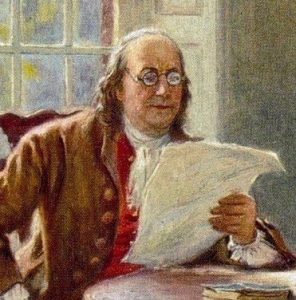
Benjamin Franklin observed, “The ordaining of laws in favor of one part of the nation, to the prejudice and oppression of another, is certainly the most erroneous and mistaken policy. An equal dispensation of protection, rights, privileges, and advantages, is what every part is entitled to, and ought to enjoy.”
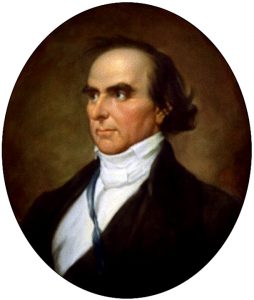
Daniel Webster said, “Good intentions will always be pleaded, for every assumption of power; but they cannot justify it … It is hardly too strong to say, that the Constitution was made to guard the people against the dangers of good intention, real or pretended.”
Let’s Review
 Here are the two principles from the Declaration of Independence we’re affirming in this session. These are the fifth and sixth tenets on our list.
Here are the two principles from the Declaration of Independence we’re affirming in this session. These are the fifth and sixth tenets on our list.
-
-
- Rights are inherent and God-given and are rooted in God’s having created members of the human race in His own image.
- “Equality” as used by Jefferson and the rest of the Founders refers to equality of worth and affirmation of natural opportunities, not to equality of outcomes achieved by government manipulation of outcomes, opportunities, or both.
-
Thank you for facilitating your group in Bible study! Have a great session!
A teaching plan is available here.
Copyright © 2020 by B. Nathaniel Sullivan. All Rights Reserved.
Unless otherwise indicated, Scripture has been taken from the New King James Version®. Copyright © 1982 by Thomas Nelson, Inc. Used by permission. All rights reserved.
Notes:
1Gary Amos, Defending the Declaration: How the Bible and Christianity Influenced the Writing of the Declaration of Independence, (Brentwood, TN: Wolgemuth and Hyatt, 1989), 77-78.
2Amos, 78.
3Ibid..
4adapted from Ray Comfort, How to Know God Exists, (Alachua, FL: Bridge-Logos, 2007), 29.
*The insight that the first two of the Four Freedoms are qualitatively different from the last two was developing in my mind when I first heard Chuck Colson express it and explain it. I have searched extensively for the source in which he wrote or spoke about this but have been unable to locate it.
Unless otherwise indicated, Scripture has been taken from the New King James Version®. Copyright © 1982 by Thomas Nelson, Inc. Used by permission. All rights reserved.
top image credit: 1973 postage stamp anticipating the US Bicentennial; the stamp depicts Patriots utilizing a printing press while examining a colonial pamphlet
image credit: Engraving of the Four Freedoms at the Franklin Delano Roosevelt Memorial in Washington, D.C.
